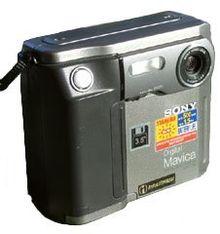Do you remember when digital photography appeared on the scene? Real photography buffs snickered about the idea of digital photography ever becoming mainstream… the images were too small, the number of megapixels was ridiculously low, and the images were, well, horrible. It’ll never take off, they said.

As time went on, digital photography got better and better. The first digital camera I owned was a Kodak DC something. It cost me about $800, shot at a whole 1 megapixel, and I thought it was the coolest thing ever. In hindsight it wasn’t. It took tiny little images that were largely useless for anything other than viewing on a low res computer screen. But at least it wasn’t that old-fashioned sort of photography that required a trip to a store to get a roll of film developed. How primitive! It was a digital camera, and I was doing digital photography. I’m hip.
Today, I have a camera in my phone that takes pretty awesome photos. My iPad has a camera. My computers have webcams. If I’m feeling a little serious about taking some photos I can use my Nikon D80 DSLR. Digital photography is everywhere.
In fact, digital photography is no longer a novelty. If you want to shoot ‘non-digital’ photography you’ll have trouble buying a camera, trouble buying film, and trouble getting it developed. Digital photography is now just normal.
What’s interesting is that I still hear people referring to ‘digital cameras’ and ‘digital photography’. It’s like we’ve been calling it ‘digital photography’ for so long now that, even when there are no realistic ‘non-digital’ options left, we still call it that.
Surely, by now it’s just a ‘camera’, and it’s ok to just call it ‘photography’?
It happens in other places too. Remember when the first analog mobile phones were around and we eventually started the move to digital mobile phones? For a while we called them ‘digital mobile phones’, until eventually we realised that since ALL phones were digital, we didn’t really need to call them that. We dropped the digital and now just call them mobile phones. (Give it a few more years and I guess we’ll just call them phones, since any phone that isn’t mobile will seem quaint and old-fashioned.)
Digital TV, digital radio, digital video recorders, even digital photo frames. Today, they are really just TV, radio, video recorders and photo frames. It’s 2012. Maybe it’s time to drop the ‘digital’ and accept that digital things are just a part of modern life.
But what about ‘Digital culture’? ‘Digital citizenship’? ‘Digital literacies’? ‘Digital storytelling’? These terms get thrown around in education circles with the same degree of novelty that ‘digital cameras’ had back in the mid 90s.
Am I wrong in thinking that ‘digital culture’ is really just ‘culture’ as practised by people living in the here and now? Isn’t ‘digital storytelling’ just storytelling using the tools of our current age? Unless you avoid all forms of technology, doesn’t being literate just assume that you are literate in digital things as well as analog things? And unless you’re living in a bubble of the past, isn’t ‘digital citizenship’ just ‘citizenship’?
As all these things moved into the digital realm over the last decade or two it may have been useful to note their ‘digital-ness’ as a way of reminding ourselves how they were different to what came before. But we are now 12 years into the 21st century. The Internet has been around for 44 years, the personal computer for over 37 years, and the World Wide Web for nearly 20. At what point will the digital nature of the world we live in stop being a novelty?
I wonder if it’s time to drop the ‘digital’ and start accepting that this is just the new normal.
